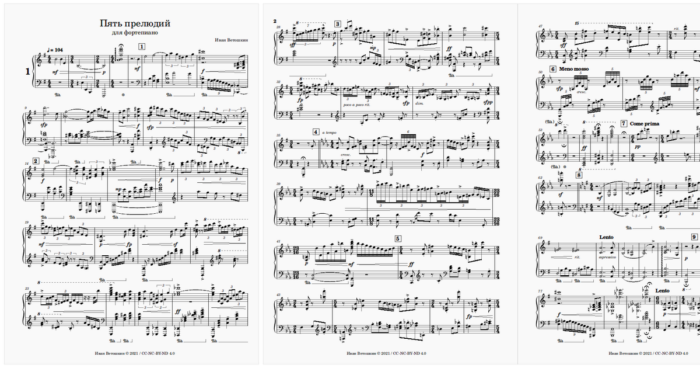I have composed five preludes for piano:
Composing them was a way of getting away from a complex project of an indefinite period: this second-order uncertainty (when not only do you not know what the future holds, but also how far are you from the desired resolution) was eating my insides, and I needed something to get distracted by. I couldn’t work productively; I couldn’t do anything demanding or implying any sort of responsibility.
Composing music came as a perfect solution. I used to be taught that as a kid by Tatiana Chudova, the prof. of the Moscow Conservatory (although she taught rather avant-garde, atonal composing than tonal, but still), and the experience seemed just enough to allow myself to try again.
These preludes are undoubtedly worse than they would be if supervised by an experienced composer, but I’m glad I tried composing them myself and learned a lot in the process.
I present them as a set, but there’s nothing really binding them together except the time of creating—summer and fall of 2021. Nevertheless, each of them has something I was proud of myself I came up with:
- No. 1. A melody (at creating which I’ve never really been good at) not developing so much but at least methodically turning up throughout the whole piece. Also some good contrasting in terms of tempo and dynamics. I really like the modulation in 3, and the beginning of 6 very much resembles a passage from the Mvt. III of Rachmaninoff’s Second Concerto (I copied it unwittingly and decided to leave the part for the sake of history when realized that).
- No. 2. While listening to that, I resent not recording a live performance and posting a MIDI recording instead: it is absolutely impossible to get any expression needed here from a sheet music editor (Musescore in my case). A romantic piece as it should be. Composed and refined in three evenings.
- No. 3. A trite melody at the beginning, but I really like the obscure modulation from C-moll to D-moll and then to E-moll, and a try to induce some counterpoint at the end of 2. 3 is where real music shows up (it must be because I realized at that point that if I don’t play around with tempo and dynamics in MuseScore, I will never get anything respectable). While composing this, I fell in love with Rachmaninoff’s concertos and started to deliberately steal cool moves from them: e.g. 3 and the very end are all built on parallel thirds from 48–49 of the Third Concerto (one of my favourite parts of it), and 5 has a poly-rhythm at the end that the Second features a lot and a chromaticism that the Third is dotted with (I’d never thought I’d love parallel thirds so much before I saw that in the score). The rest of 5 has a lot of this quirky element from the Ballade No. 1 by Chopin. (Also, the sheet music of 4 can be used to scare children; however, this is not checked and not a legal advice.)
- No. 4. Quite depressing. As No. 2, not perfectly performed by MuseScore, but closer to the ideal performance than No. 2, as the ideal performance of this one would be more rhytmic. Composed in one night.
- No. 5. Most recently written, so I consider it the best. A simple melody is complicated a bit with grace notes and chromatic modulations. I started really adoring chromaticisms by the time of writing this, so 4 и 5 are almost entirely based on them, and bar 49 (7) features a culmination made of them as well (and here comes a poly-rhythm again).
One of my goals was to write something that I, presumably, could play. I’ve never learnt these preludes (this is the reason why I posted MIDI), but have checked them for theoretical playability. If you play piano and would like to play them—I’d be glad to hear; please email me if that’s the case.
Here is the sheet music in PDF format (13 pages, 350 KB) and the set on MuseScore. The videos and sheet music are distributed under CC-BY-SA-ND. Email me if you’d like to use any of that commercially or make a derivative.
Also, if you spot an error in the sheet music (especially in the accidentals), or some unplayable bars, or just want to leave a reply — do not hesitate to do that in the comments.
One day I may post a live performance, if I have a lot of spare time to learn and record it.


